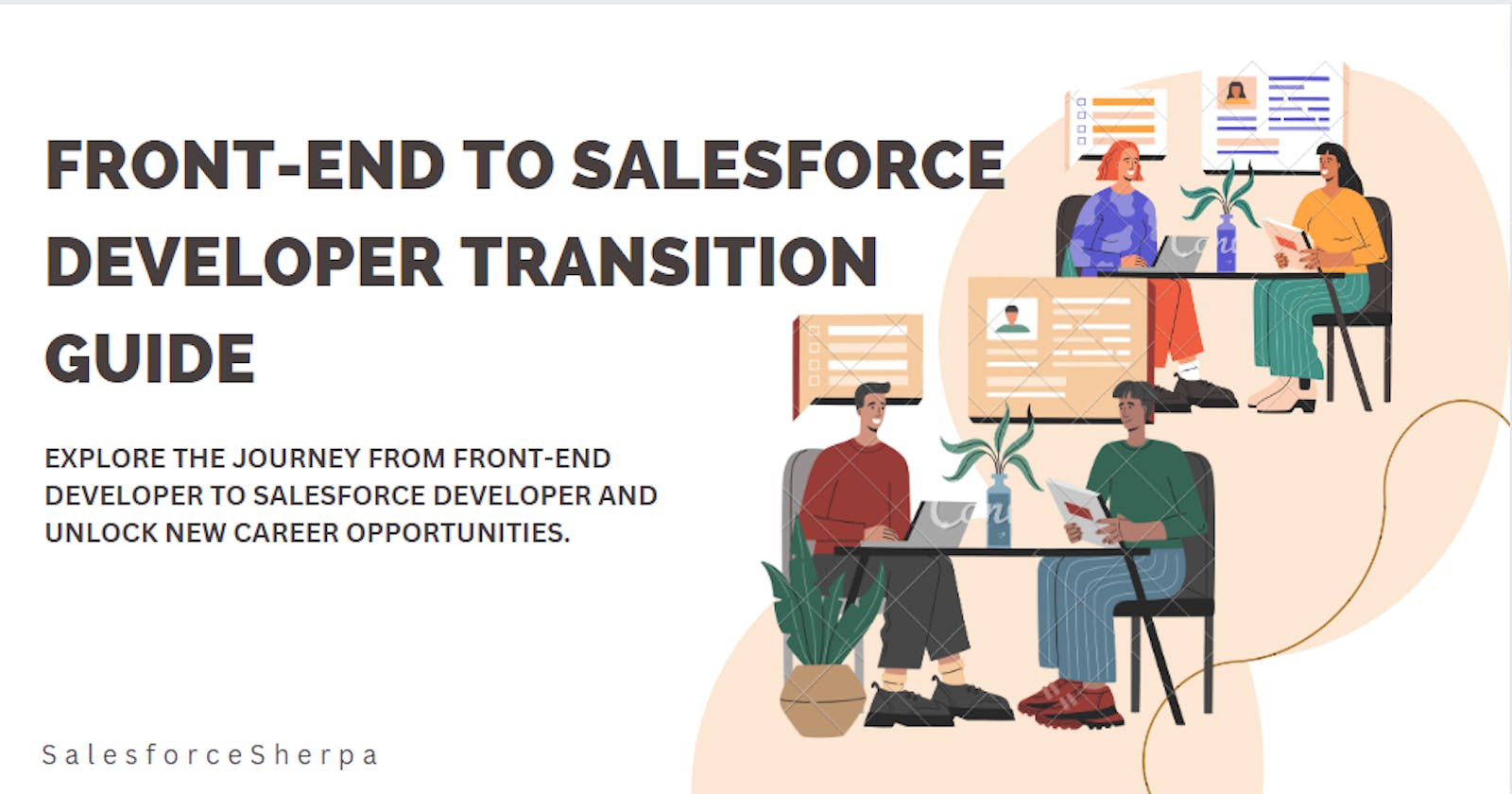From Working as a Front-End Developer to Salesforce Developer: A Career Transition Guide.
In today's ever-evolving tech industry, professionals often find themselves at crossroads, contemplating career transitions. One such transition that has gained prominence is the shift from being a Front-End Developer to a Salesforce Developer. This journey can be both challenging and rewarding, as it involves mastering new skills, technologies, and a unique ecosystem. In this comprehensive guide, we will explore the steps, skills, and opportunities associated with transitioning from a Front-End Developer to a Salesforce Developer.
Understanding the Roles
Front-End Developer
Front-End Developers primarily focus on creating the user interface and user experience of websites and applications. They work with HTML, CSS, and JavaScript to ensure that web pages are visually appealing and responsive.
Salesforce Developer
Salesforce Developers, on the other hand, specialize in customizing and developing applications on the Salesforce platform. Their role involves creating solutions that streamline business processes, improve customer relationship management, and enhance overall productivity.
Assessing the Motivation
Why Transition?
Before embarking on this journey, it's essential to identify your motivation for transitioning. Is it the allure of a new challenge, a desire for career growth, or the prospect of working with a dynamic and rapidly expanding platform like Salesforce?
Research and Self-Assessment
Take the time to research the Salesforce ecosystem and assess your current skills. Identify areas where your Front-End Developer skills align with Salesforce development and areas that require further development.
Acquiring Salesforce Knowledge
Trailhead - Your Learning Companion
Salesforce offers an excellent learning platform called Trailhead. It provides free, hands-on tutorials and modules that cover everything from the basics to advanced topics. Start your journey by creating a Trailhead account.
Online Courses and Certifications
Consider enrolling in online courses and certifications specific to Salesforce development. Certifications such as Salesforce Certified Platform Developer I can boost your credibility and knowledge.
Building Salesforce Skills
Apex, Visualforce, and Lightning
Salesforce Developers must be proficient in Apex (a proprietary language), Visualforce (for UI development), and Lightning (a modern framework). Invest time in mastering these technologies.
Integrations and Data Modeling
Understanding how to integrate Salesforce with other systems and efficiently model data is crucial. These skills will enable you to create robust solutions for clients.
Gaining Practical Experience
Personal Projects
Apply your newfound Salesforce knowledge by working on personal projects. Build applications and solutions to showcase your skills to potential employers or clients.
Volunteer and Freelance Work
Consider volunteering for nonprofit organizations or taking on freelance projects. These experiences not only provide practical exposure but also expand your network.
Networking and Mentorship
Salesforce Community
Join the Salesforce community and engage with other developers. Forums, meetups, and events are excellent opportunities to learn from peers and share your experiences.
Seek a Mentor
Finding a mentor who is an experienced Salesforce Developer can provide invaluable guidance and insights throughout your transition journey.
Navigating the Job Market
Tailored Resume
Craft a resume that highlights your relevant Front-End Developer experience and your newly acquired Salesforce skills. Emphasize how these skills complement each other.
Job Search Strategies
Use job search platforms like LinkedIn and Salesforce-specific job boards to find suitable openings. Tailor your applications to each job's requirements.
Conclusion
Transitioning from a Front-End Developer to a Salesforce Developer is an exciting career move that opens doors to a world of opportunities in the dynamic Salesforce ecosystem. By following the outlined steps, acquiring the necessary skills, and staying committed to your goals, you can successfully make this transition.
FAQs
Is coding experience necessary to become a Salesforce Developer?
While coding experience is beneficial, it's not mandatory. Salesforce offers low-code and no-code tools, making it accessible to a broader range of professionals.
How long does it take to transition to a Salesforce Developer role?
The timeline varies depending on your starting point and dedication. On average, it may take several months to a year to become proficient.
Are Salesforce Developers in Demand?
Yes, Salesforce Developers are in high demand, with many job opportunities across industries.
What salary can I expect as a Salesforce Developer?
Salaries for Salesforce Developers vary by location and experience but are generally competitive, with ample room for growth.
Is Trailhead the only learning resource for Salesforce?
While Trailhead is an excellent resource, there are many other online courses, books, and communities that can supplement your learning journey.
In conclusion, embarking on a career transition from Front-End Development to Salesforce Development is a significant step. However, with the right motivation, dedication, and resources, you can successfully make this transition and tap into the thriving world of Salesforce development.
